The 2012 MacBook Pro Review
by Vivek Gowri on July 18, 2012 2:00 PM EST- Posted in
- Mac
- Apple
- MacBook Pro
- Laptops
- Notebooks
From a performance standpoint, the 2012 MBP lines up basically where we would expect it. My tester was the high-spec SKU with the same 2.6GHz i7-3720QM, 8GB of DDR3, and 1GB GT 650M as Anand’s Retina MacBook Pro evaluation unit, with the primary hardware difference being the 750GB mechanical hard drive in place of the Samsung PM830-based SSD in the rMBP. Performance matched up pretty close, with the MBP being just a tick behind the rMBP in most of our benchmark suite. And with the performance deltas we're talking about, it's really almost like splitting hairs.
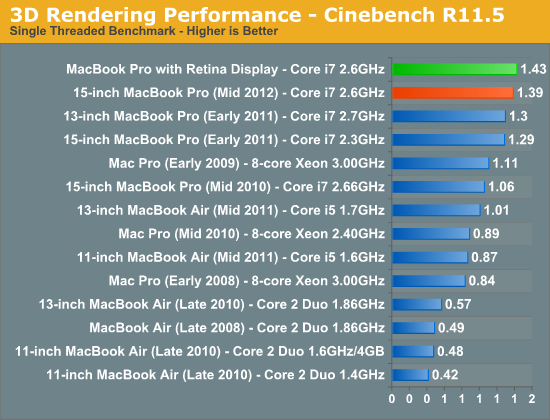
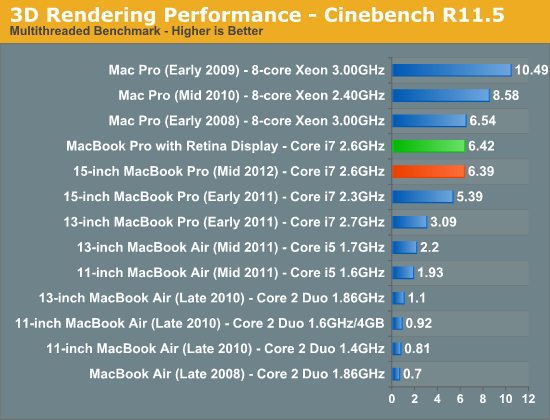
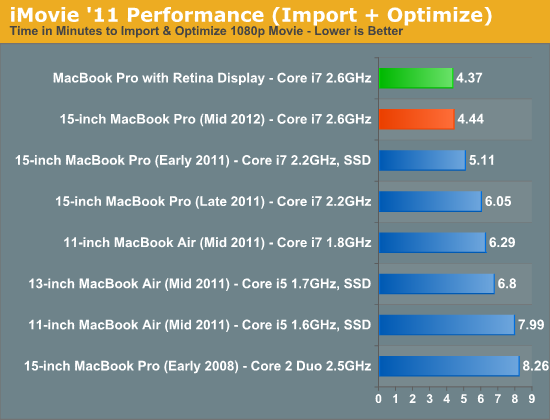
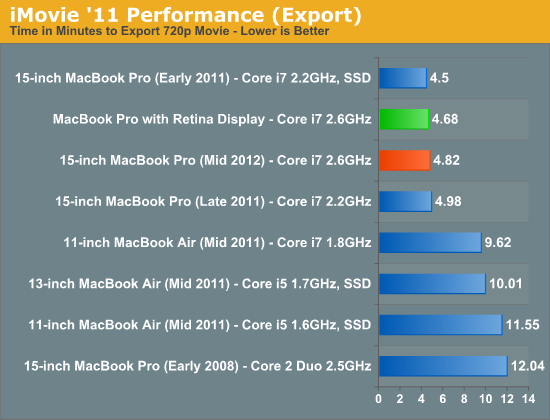
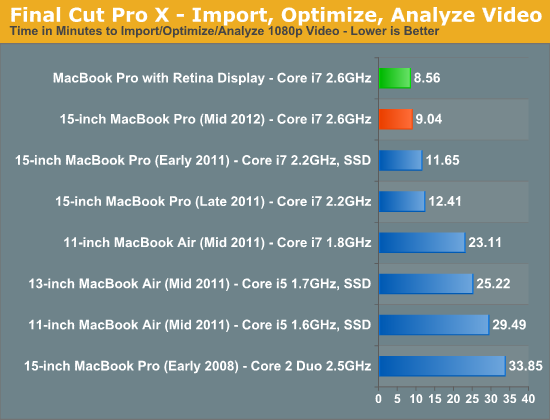
It appears that the i7's Turbo mode is less aggressive in the MBP versus the Retina, possibly due to the revised cooling system that the Retina model has. The 2012 MBP retains the same thermal design as the 2011 model, so it's unsurprising to see that Apple is being more cautious with it.
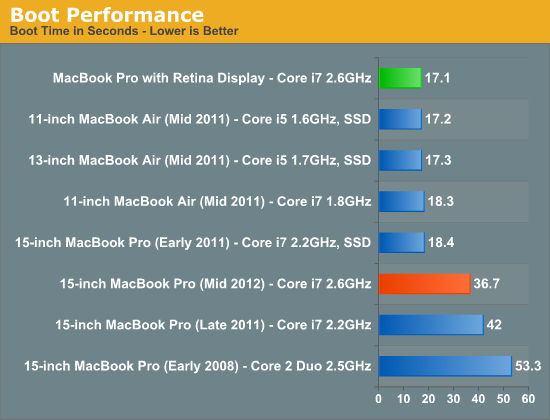
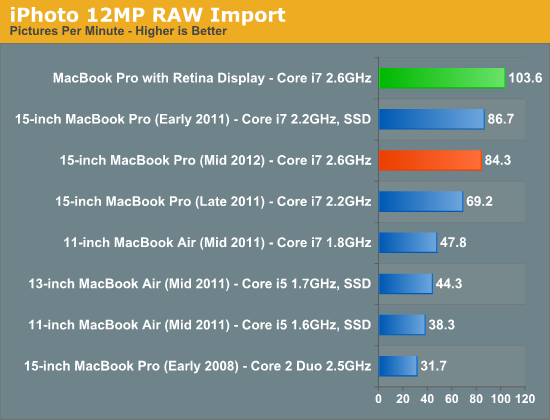
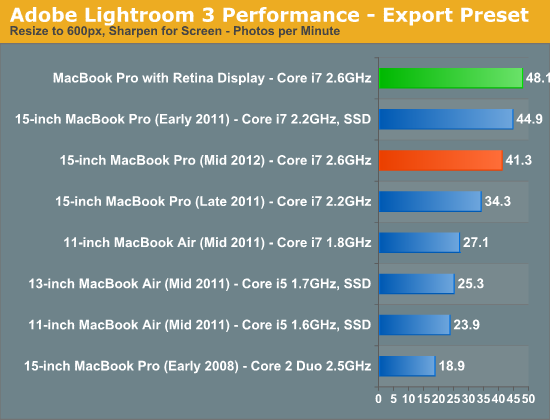
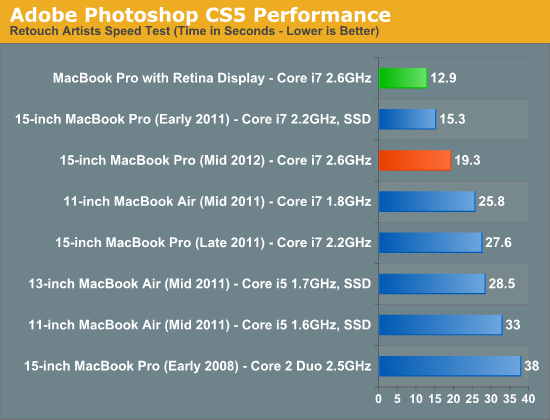
The SSD-based Retina obviously has faster boot times and performs significantly better in any disk-based activity. Based on my limited experiences with the Retina, it really feels substantially more responsive. Our usual recommendation from the last couple of years stands here too: if you're buying a new MacBook Pro, your first upgrade should be to add an SSD.
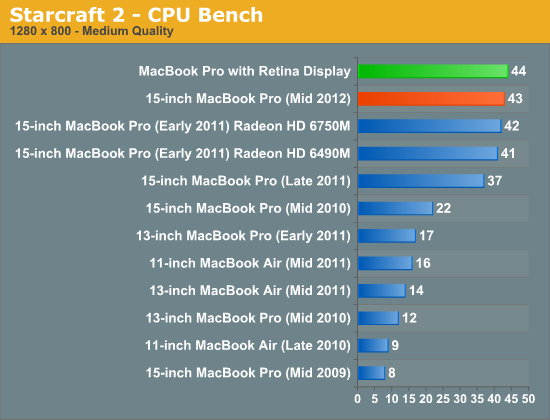
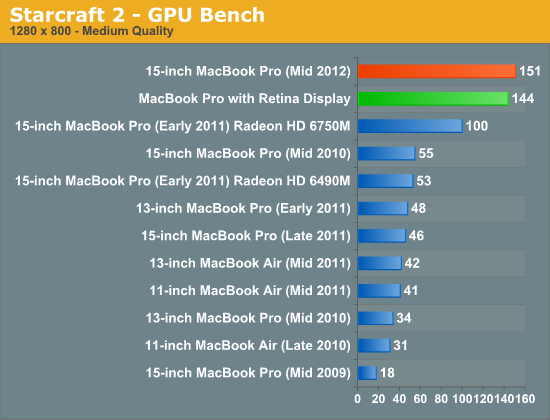
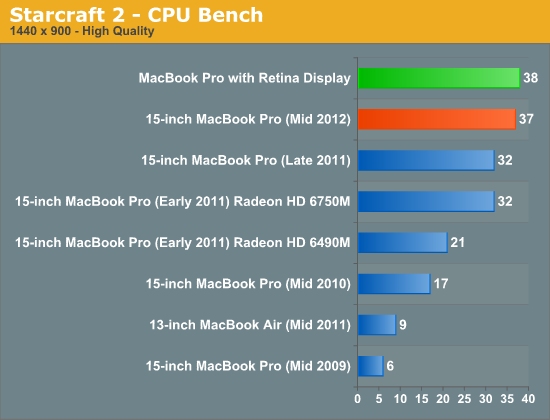
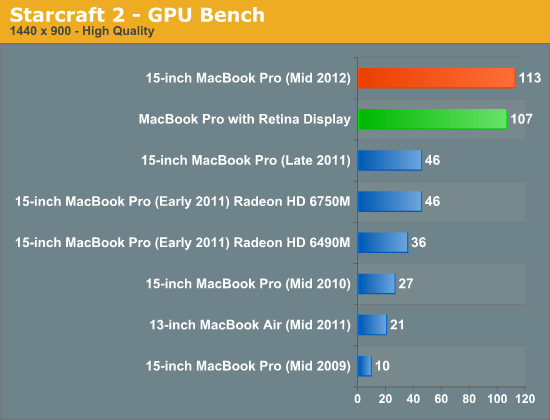
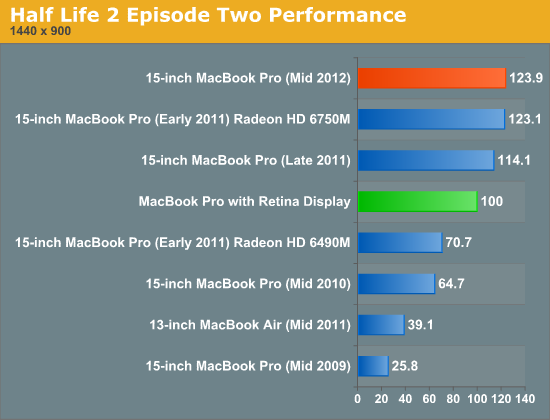
GPU performance is substantially improved over the 2011 MBP, with the GT 650M outpacing both the HD 6750 and 6770, to say nothing of the HD 6490 in the early 2011 Pro. We saw roughly equivalent performance with the rMBP again, with the MBP maintaining a slight edge over the Retina, but again with a margin of less than 5%.
We took a look at performance over time, and as expected, Ivy Bridge and Kepler do a really good job of minimizing heat buildup over time and the corresponding amount of throttling that occurs. Through 40 runs of our Half-Life 2 test (at native res with maxed out settings), I ended up with nearly identical numbers the entire way through, with a very slight downward trend emerging (the delta between the average of runs 2 through 10 was a bit under 1% better than the average of runs 32 through 40). It's pretty much a flat line all the way across, the new chips really let the MBP run at significantly lower temperatures. Using it versus a Core 2 or SNB MacBook Pro, it noticeably doesn't get anywhere near as hot to the touch in day to day use.
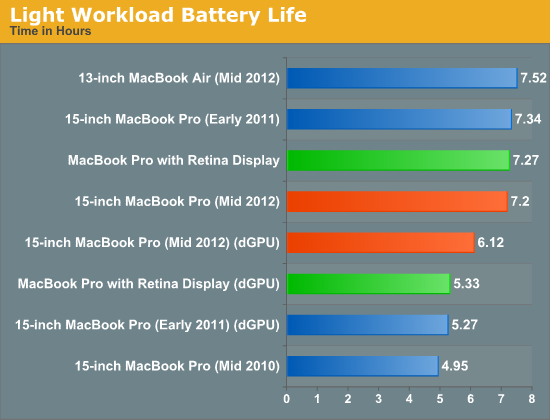
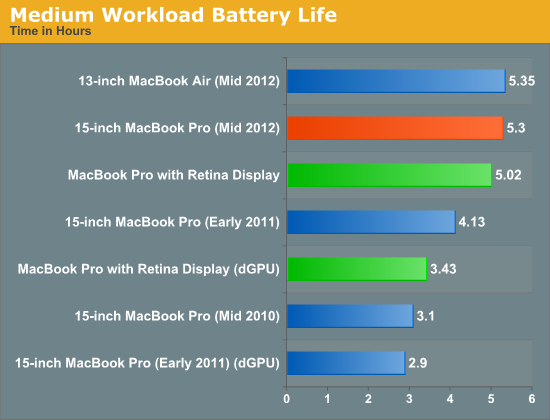
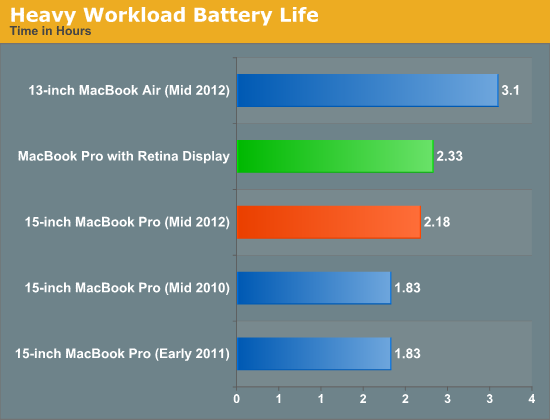
Battery life is pretty solid – we got a bit over 7 hours in our light web browsing test (with dynamic GPU switching on), a hair over 6 with dynamic GPU switching off (forcing the GPU to stay on), close to 5.5 hours in our medium-heavy browsing workload, and a bit over 2 hours in our brutal, heavy use case test (which adds a 1MB/s file transfer and a looping 1080p video to our heavy browsing test). Apple quotes 7 hours of “normal” use, and that’s about right based on my standard usage – if you use your notebook for light browsing and word processing with medium levels of brightness, you’ll get at least 7 hours if not a bit more. Obviously, once you start hitting the dGPU hard, it’ll die pretty quickly, but at least GPU efficiency has improved enough that just leaving the GPU on in light workloads doesn’t run down the battery too much.


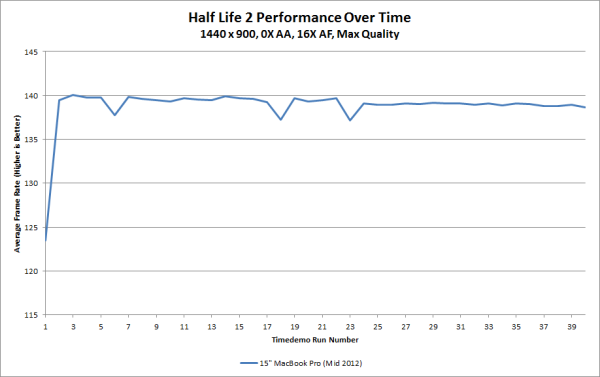








132 Comments
View All Comments
dwade123 - Thursday, July 19, 2012 - link
Apple needs to redesign the 13" Pro. Get rid of optical drive, put in Quadcore, Retina, and at least a GT 640m.Airkol - Thursday, July 19, 2012 - link
I've got the Retina but but I want to make this thing rock. I need a fast 512GB drive. This samsung drive is a slug.
I see OWC just announced their upgrade for the MBA 2012. Any word on them having an upgrade fro the Retina?
EnerJi - Thursday, July 19, 2012 - link
I was under the impression that Apple was now shipping pretty fast SSDs? So fast that most users (in most use cases) wouldn't be able to tell the difference between their SSD and a top-of-the-line model.Airkol - Friday, July 20, 2012 - link
One of the drives used in the MBA is a Toshiba that uses the SandForce controller. That is pretty fast. The Retina uses Samsung based drives and they aren't as fast.I went with the base model Retina and the 256GB drive. I'm betting that OWC will have a 480GB drive and an external case for the drive I pull out for less than the difference between the next model up with a 512Gb drive.
Death666Angel - Friday, July 20, 2012 - link
http://www.anandtech.com/show/6005/apples-new-ssd-...Depending on what you do with it, it's pretty fast. :D
Paapaa125 - Saturday, July 21, 2012 - link
Actually Samsung is the faster of the two AFAIK. It is essentially Samsung 830 SSD drive which is one of the fastest SSDs out there and very reliable. Still the best choice for almost all desktop users. You should feel lucky you got Samsung instead of Toshiba.dsumanik - Thursday, July 19, 2012 - link
C'mon Vivek, ethernet no longer relevant?I concede that using a thunderbolt port for an adapter is an appropriate substitute, i mean what does it matter if you are plugging in a cable with a dongle on the end, vs a plain old rj45 connector.
But until wireless networking catches up with ethernet in the latency and STABILITY department, it will always be necessary.
Wireless technology developments seems to keep pushing bandwidth...i want consistent 1ms ping throughput and a 500 meter range without bandwidth/connection loss.
actually screw that, i want one nanosecond throughput...latency is the biggest holdup for all of us now, just like going from a mechanical HDD to a SSD drive, the difference on a wired vs wireless network is immediately noticeable....especially through apps like VNC or remote desktop.
Imagine if the entire north american internet infrastructure went wireless...lol. It would take 5 seconds just to ping this page and 30 seconds to load....after the third try.
Eventually, wireless has the potential and will likely replace wired networks...but today is not that day, id say at least 10 years.
EnerJi - Thursday, July 19, 2012 - link
Everyone's needs are different. Is a wired connection objectively "better?" Yes. Is wireless considered "good enough" for the vast majority of people? Absolutely yes.I've used Ethernet *maybe* three or four times in the past three years for troubleshooting purposes. Will I miss it if I were to get an rMBP? Hard to say for sure, but I'm leaning towards probably not.
The0ne - Thursday, July 19, 2012 - link
I haven't even touch my ethernet port at all. I've traveled quite often overseas as well and still don't even have a need. That is because wi-fi is so abundant and easy to set up that ethernet is just not useful as it once was. Sure it can have it uses when troubleshooting, the only thing I can see myself using it for, but other than that wi-fi serves the 99% fine.zephxiii - Friday, July 20, 2012 - link
I definitely need this for large transfers to and from the server. Sure u can use an adapter...but i hate having to fumble with and carry around adapters.An optical drive is nice for when u *need* to burn something, or access a disc. Granted i rarely use mine but i like being able to burn something when needed without being inconvenienced.
Seems like this *tool* has become less of a tool :(